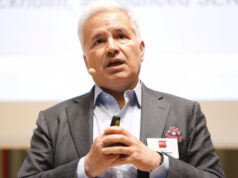
AACR sätter fokus på individanpassade cancervacciner
Moderna fick mycket uppmärksamhet då man rapporterade kliniska data med sitt individanpassade mRNA-cancervaccin vid AACR. På konferensen visade även Evaxion Biotech upp sin egen individanpassade cancerimmunterapi och presenterade lovande fas I/II-data för sin kandidat EVX-02. BioStock pratade med Evaxions Chief Scientific Officer Birgitte Rønø för att få veta mer om Evaxion planer på att påverka landskapet för cancerimmunterapi.
Den amerikanska vaccinutvecklaren Moderna hamnade i rampljuset när man introducerade sitt mRNA covid-19-vaccin. Nu hoppas bolaget kunna utnyttja samma teknik i kampen mot cancer genom att utveckla ett individanpassat terapeutiskt cancervaccin.
Vid årets upplaga av American Association of Cancer Research (AACR) presenterade Moderna data från en fas II-studie som utvärderade vaccinet i kombination med Mercks checkpointhämmare Keytruda. Enligt denna data kan vaccinet minska risken för återfall av melanom med 44 procent jämfört med behandling med enbart Keytruda. Detta är en viktig nyhet – trots att checkpointhämmare har ökat i popularitet under de senaste decennierna erbjuder de fortfarande bara marginella fördelar för vissa patienter. Faktum är att cancer fortfarande är en av de främsta dödsorsakerna globalt.
Moderna räknar med att inleda fas III-studier i slutet av 2023.
En individanpassad behandling
Moderna kallar sitt vaccin en individualiserad eller personanpassad neoantigenbehandling. Bolagets vd Stéphane Bancel förklarar konceptet i ett blogginlägg och säger att cancer skiljer sig från patient till patient. Detta beror på att cancerceller har ett unikt fingeravtryck som ges av genetiska mutationer, manifesterade av proteiner som kallas neoantigener.
Därför konstrueras ett individanpassat neoantigenvaccin specifikt för varje enskild patient. Bancel skriver att “the goal of individualised neoantigen therapies is to train a patient’s immune cells to recognise the cancer fingerprint proteins and launch an immune response against the cancer cells.”
Bancel påpekar också att det för närvarande inte finns några godkända individanpassade neoantigenterapier, men han tror att detta snart kommer att förändras.
Evaxion presenterar lovande data för EVX-02
Moderna var inte den enda cancervaccinutvecklaren att presentera sina resultat på AACR. Evaxion Biotech, baserat i Köpenhamn, presenterade data från en fas I/IIa-studie med sin egen individanpassade cancervaccinkandidat – EVX-02. Vaccinet utvärderas i kombination med checkpointhämmaren nivolumab hos patienter som genomgått fullständig kirurgisk resektion av melanom i sen fas. Detta innebär att patienterna hade en hög risk för återfall av cancer.
»Personalised cancer vaccines offer a promising approach to cancer treatment by targeting the unique and specific tumour profile of each patient while accommodating their individual immune system’s specificities. Unlike previous unsuccessful attempts in the cancer vaccine fields, personalised cancer vaccines hold great potential because they are tailored to each patient« — Birgitte Rønø, CSO Evaxion Biotech
Till skillnad från Modernas vaccin är EVX-02 DNA-baserat, vilket gör det mer stabilt. Dessutom utvecklades Evaxions kandidat med bolagets egenutvecklade AI-baserade plattform PIONEER. Plattformen väljer de neoantigener som ska användas som målmolekyler konstruerade inom vaccinet baserat på stora mängder data om det mänskliga immunsystemet.
Resultaten visar att samtliga 10 patienter med melanom i sen fas som fullföljde EVX-02-behandlingen uppvisade robusta och behandlingsspecifika immunsvar och var återfallsfria vid deras senaste bedömning.
Enligt Evaxions vd Per Norlén validerar datan förmågan hos bolagets AI-teknik att välja rätt neoantigener, vilket är avgörande för utvecklingen av Evaxions ledande cancervaccinkandidat EVX-01, som för närvarande utvärderas i kombination med Keytruda i en fas II-studie i patienter med metastaserat melanom. Det är minst lika viktigt för bolagets nästa generations individanpassade neoantigenvaccin EVX-03, som är en DNA-baserad immunterapi beväpnad med ett genetiskt immunadjuvans och ytterligare antigener som kallas ERV. Läs det senaste om EVX-01 här, och om EVX-03 här.
Evaxions CSO kommenterar
För att få veta mer om cancervaccinlandskapet och var Evaxion passar in, pratade BioStock med bolagets CSO Birgitte Rønø som också presenterade EVX-02 på AACR.
Birgitte, what do you make of the Moderna data presented at AACR?
– The mRNA-based cancer vaccine RNA-4157/V940 from Moderna, when administered along with the immune checkpoint inhibitor pembrolizumab (Keytruda), has demonstrated significant improvement in recurrence-free survival (RFS) in patients with high-risk melanoma, as per the results of the phase IIb study. This marks a significant milestone in the field of personalised vaccines as it is first data from a randomised phase IIb study that has shown such promising results. Moderna deserves applause for this breakthrough achievement. However, it is important to note that the KEYNOTE-942 trial, while randomised, is a phase IIb study with limited statistical power. Despite this limitation, the results of the study are extremely promising as they provide hope that this therapeutic approach will indeed yield clinical benefits.
What was your experience at the AACR this year?
– It is always a great pleasure to attend the AACR annaul meeting. It is very inspiring and the enthusiasm in the field is remarkable. The presentation of the KEYNOTE-942 data from Moderna/Merck was undoubtedly the highlight of the event. While it is important to point out that more data is needed to confirm the excellent results presented by Moderna, the positive impact this breakthrough could have on cancer treatment cannot be overstated.
– Further, I was stunned by the immense amount of data being generated in all aspect of cancer research. One of the current and potentially persistent challenges in biomedical research, and even in the world at large, is finding solutions for managing and using the data. To address this challenge, the future of research lies in automated systems, artificial intelligence, and machine learning. These technologies offer the promise of finding intelligent solutions to manage and harness the value of data being generated.
Looking specifically at the data you presented during the conference, how significant is it, and what does it mean for project moving forward?
– We are very excited about the data from our EVX-02 clinical trial as they prove our ability to select clinically relevant neoantigens with our AI platform, and further it substantiates that DNA-based delivery of neoantigens drive a meaningful immunological response. Moreover, our team’s ability to manufacture the EVX-02 vaccines during the challenging Covid pandemic is a significant accomplishment. With our upcoming personalised DNA-based vaccine, EVX-03, we anticipate providing an even more potent vaccine to a broader range of patients, including those who may not benefit from neoantigen targeting vaccines currently under development by Moderna and other companies.

Both EVX-02 and Moderna’s vaccines are aimed at preventing cancer recurrence in melanoma patients undergoing complete tumour resection. Why is this patient population chosen for such a therapy?
– The risk of recurrence still persists in patients with advanced melanoma, even after undergoing surgery with complete removal of their tumours, and administering checkpoint inhibitors may not be enough to prevent it. The one-year recurrence-free survival (RSF) rate for these patients is approximately 30 per cent, while the estimated 5-year RFS rate for these patients is reported to be between 40-50 per cent., The numbers underscore the significant medical need for effective interventions in this patient population. In our EVX-02 trial, none of the patients who received the complete EVX-02 immunisation schedule experienced a relapse. Despite the small size of the study, the encouraging initial clinical data and favourable safety profiles of our personalised vaccines, as well as others, provide hope to provide for better support for cancer patients at-risk in the future.
Both Evaxion and Moderna refer to their respective vaccines as personalised. Could you speak to the similarities and differences between the two approaches?
– Both our EVX-02 therapy and the Moderna’s mRNA-4157/V940 are truly personalised cancer vaccines that are based on the the same principles. In both cases, the vaccines include tumour-specific sequences designed to train the patients’ immune system to fight the cancer. To create the vaccines, a tumour specimen and a blood sample are collected from the patient and the DNA and RNA are purified. Next-generation sequencing is then performed on the samples to generate data that serve as input to AI-based target discovery platforms. These platforms identify tumour sequences with the highest likelihood of eliciting a clinically meaningful immune response when incorporated in a vaccine. The sequences identified by the AI models are so called neoantigens – antigens derived from somatic mutations in the tumour DNA and are exclusively presented on the surface of tumour cells. This makes them attractive targets for immune cell-directed killing. The top-ranked neoantigens are included in the personalised vaccine, in our case as a plasmid DNA based vaccine, while Moderna uses mRNA as vaccine platform.
– At Evaxion we have been using AI models for over a decade to develop vaccines, and we are proud to be at the forefront of AI-powered vaccine target discovery. Our top-tuned algorithms out-perform public tools with improved precision to identify clinically relevant neoantigens. We are confident that our approach will lead to the development of more effective vaccines that can address a range of diseases.
Finally, in your opinion, are cancer vaccines the answer we’ve been looking for in the quest to defeat cancer?
– Personalised cancer vaccines offer a promising approach to cancer treatment by targeting the unique and specific tumour profile of each patient while accommodating their individual immune system’s specificities. Unlike previous unsuccessful attempts in the cancer vaccine fields, personalised cancer vaccines hold great potential because they are tailored to each patient. The failure of earlier cancer vaccines highlights the critical importance of developing treatments that address the diversity of each patient’s immune system. This can only be achieved through a personalised approach.
– Although personalised cancer vaccines hold great promise, several challenges need to be addressed before they can be widely available. Firstly, it is necessary to confirm the finding from the Moderna trial and demonstrate robustness and benefits for the majority of vaccinated patients. Secondly, the manufacturing time needs to be reduced as patients with even more aggressive cancers may not benefit from the vaccines if it not delivered quickly. Thirdly, creative solutions to reduce cost of personalised vaccines, such as small-scale bedside manufacturing processes, need to be explored. However, I’m optimistic that these challenges can be overcome as emerging technologies continue to mature. DNA can in fact be produced synthetically, meaning that we could potentially “print” the drug at the bedside in the future. I believe that such DNA-based immunotherapies will be possible to produce at the hospitals, so that doctors could be able to provide a personalised therapy within days or even within hours of a tumour biopsy. It sounds mind-blowing but I think it could be a reality within the next 10 to 15 years.
För en mer allmän översikt över cancervaccinlandskapet, läs här.
Innehållet i BioStocks nyheter och analyser är oberoende men BioStocks verksamhet är i viss mån finansierad av bolag i branschen. Detta inlägg avser ett bolag som BioStock erhållit finansiering från.


